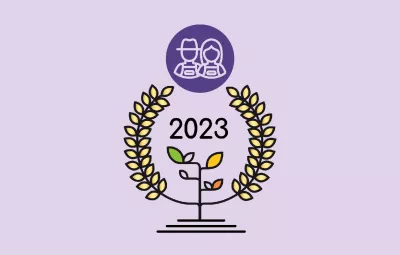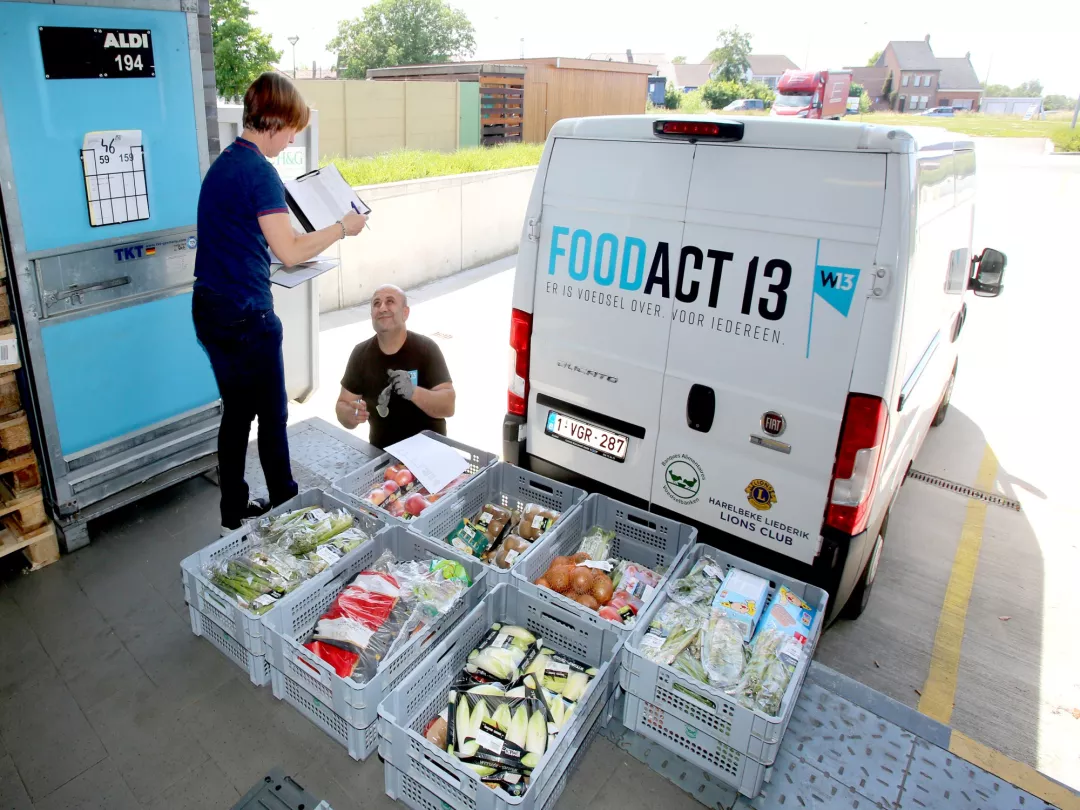General information
RDP Priority
- P6. Social inclusion and local development
RDP Focus Area
- 6B: Local development
RDP Measure
- M16: Cooperation
Beneficiary type
- Public authority / body
Summary
The welfare association W13, in Flanders, Belgium, developed the project ‘Food Act 13’ with the aim of providing an innovative and efficient logistics system for local food distribution centres in south west Flanders. At the same time, the project sought to ‘activate’ long-term unemployed people and prepare them to re-enter the job market through training.
Since the start of the project, more than 130 people have worked with the project, gaining relevant skills and experience. Access to the project has been organised through several job and welfare organisations, including the VDAB (Flemish governmental job search organisation), the OCMW (the public centre for social welfare) and the GTB (specialised team mediation service). Temporary work experiences have been offered as administrative employees, drivers or co-drivers and warehouse workers.
Results
- Since 2018, Food Act 13 has trained and empowered 130 long-term unemployed and people on a living wage with different cultural backgrounds and genders. The majority were young people. Eight people per year find employment after their work experience with Food Act 13. Approximately 80% of the young people find regular work after leaving the project.
- Since it started, Food Act 13 has built a unique private-public partnership.
- The project has collected 1 068 386 kg of fresh food (worth €6.4 million) from retailers and farms and supplies the food to 60 local organisations, reaching 5 000 families in poverty.
- Saving fresh food contributed to reducing landfill and CO2 emissions.
- The project inspired 11 other similar initiatives.
- The Flemish Government recognises the unique role of this project in bridging different policy areas: social economy, environmental sustainability and welfare.

Promoter
W13 (the South-West Flemish welfare association)
Funding
Total budget: 515 293.00 (EUR)
EAFRD: 167 470.23 (EUR)
National/Regional: 167 470.22 (EUR)
Private/Own funds: 80 342.55 (EUR)
Other funding sources: 100 010.00 (EUR)
Resources
Documents
Context
In Belgium, more than 240 000 people use food aid services. In the region of south west Flanders, 5 000 inhabitants live in poverty or are in a vulnerable situation and in need of food aid.
And yet, a third of all our food is thrown away. In south west Flanders, this issue is addressed by numerous food distribution organisations, social organisations/restaurants, and social economy projects. Before the end of 2018, each food distribution organisation was taking care of its own needs, collecting unwanted food across the region and often buying additional food to meet their needs. However, this individualised approach was costly and a logistical system that operated at a regional level was needed to improve efficiency.
Besides food distribution, a further regional challenge was the low employment rate. It was difficult for low-skilled, inexperienced people to find an easy entry-level job or low-threshold workplaces. People with a migrant background were especially affected by this as they constitute the largest group among the low-skilled in Flanders. However, the job market showed a demand for specific jobs, particularly in logistics. Better coordination at a regional level was needed to address these various challenges together.
Responding to this need, and with food poverty as a key theme of their multiannual action plan, W13, the regional association of 14 local municipalities in south west Flanders, decided to scale up a local good practice project as a good practice project at the regional level. The project is located in Kortrijk and called Food Act.
Objectives
The objectives of the new Food Act 13 project are:
- To contribute to reducing food waste and CO2 emissions by improving the efficiency of the logistics system at a regional level.
- To contribute to poverty reduction, delivering emergency aid to people in vulnerable situations.
To create employment and training opportunities for people in vulnerable situations, fostering labour participation and employment of the long-term unemployed and low-skilled, in order to fight poverty and social exclusion.
Activities
In 2018, Rural Development Programme (RDP) funds made it possible to scale up the local Food Act project in Kortrijk and to launch it at the regional level. The following activities were implemented:
Initial investments were required to operate the project and its logistics effectively, including the purchase of one fully equipped cold store, two refrigerated delivery vans, small-scale equipment (e.g. cool boxes, office and IT equipment) to complete the renovation of a warehouse.
In addition, more staff were hired to implement the project on a larger scale. This created nearly two full-time equivalent (FTE) positions (0.5 FTE for operational coordination and management, 1 FTE work coaching and 0.3 FTE administration).
The project built new relationships with many organisations (food retailers, farmers, local food banks etc.) to boost cooperation within the area of food collection and distribution. Partners included the Colruyt Group (one of the biggest retailers in Belgium) in the development of just-in-time logistics, work floor techniques, technologies and digitalisation aspects to improve its efficiency in food distribution, as well as Food Bank West-Flanders, local food retailers, social (food distribution) organisations in the region, local authorities and other food distribution platforms in Flanders.
In parallel, the project established partnerships to foster employment and training for the long-term unemployed and vulnerable groups, particularly to comply with specific administrative and legal requirements. For example, the target group employees are employed by 14 local municipalities through their temporary work experience measures.
The project implements training and innovative activities such as learning networks. It provides support on themes like client mapping, food safety, cooperation with public welfare centres, exchange of experience, joint purchasing and sharing of resources. It also offers support on relevant topics (e.g. food safety, exchange of experiences, cooperation with public centres of welfare), language coaching and competence-based evaluations.
Main Results
Food Act 13 has worked with 130 long-term unemployed and people on a living wage with different cultural backgrounds and genders since November 2018. The majority were young people.
The project implements training and innovative activities for unemployed people, such as learning networks, with a focus on jobs in high demand. It also offers guidance, language coaching and competence-based evaluations. On average, every year eight people find employment after their work experience with Food Act 13 and approximately 80% of the young people find regular work after leaving the project.
Since it started, Food Act 13 has built a unique private-public partnership, enabling the project to collect 1 068 tonnes of fresh vegetables, fruit, meat and fish (worth €6.4m) from retailers and from ten farms. The food was then supplied to 60 local organisations, reaching 5 000 families in poverty.
In 2022 alone, 510 tonnes of fresh food were saved from going to landfill, which represents an annual CO2 reduction of 1 632 tonnes, with positive environmental impacts. The project inspired 11 other similar initiatives.
The Flemish Government recognises the unique role of this project in bridging different policy areas: social economy, environmental sustainability and welfare. The project is now included in the Flemish Government’s action plan against food waste.
Food Act 13 takes an active role in influencing policy planning, including the Flemish agricultural policy, and in the training and empowerment of unemployed people. The project continues to operate with funding from local governments and local food banks.
Key lessons
Key elements are to establish a good partnership with other stakeholders and to create a sound understanding of each other's merits and ambitions that can complement each other. By looking for solutions and sharing expertise, partners gain confidence and can progress towards essential goals.
A broad-based partnership also helps convince others to contribute and join in.
Good communication with all relevant stakeholders in the project is essential to get everyone on board and avoid misunderstandings. Regular team meetings also help to keep the team members informed. When in doubt, talk it through and always work on the basis of trust to progress successfully.
Numbers are important. Project calculations indicate that Food Act 13 distributed food to the value of €6m. These figures attract the attention of institutions and convince local governments to further engage and support the project.
It is advisable to share expertise, equipment and logistics and to join forces to generate ongoing improvement, efficiency gains and funding.
Arnout Vercruysse

